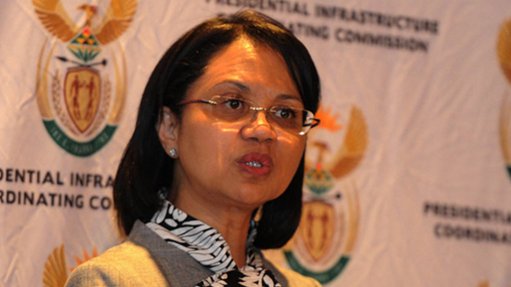
Tina Joemat-Petterson
On 12 March 2015, the National Energy Regulator decided on the tariffs for Transnet's petroleum pipelines for the period from 01 April 2015 to 04 April 2016.
The tariffs were increased and the impact on the Gauteng petrol price is expected to be +1.89 cents per litre (c/l). This represents a 0.17% increase in the March 2015 retail price of 93 octane petrol in Gauteng. This will be the impact if the Minister of Energy decides to use the pipeline tariff as a proxy for the cost of transporting fuel from Durban to Johannesburg, as has been the case in the past. All Transnet pipeline tariffs will be increased by 6.9% compared to the 2014/15 tariff period. Transnet applied for an 8.2% increase in tariffs.
In arriving at its decision, the National Energy Regulator weighed a variety of factors, including public interest, regulatory certainty, and Transnet's forecasts for the completion of certain parts of its New Multi Products Pipeline (NMPP) project.
Transnet is permitted an increase in Allowable Revenue from R2 938 million in 2014/15 to R3 357 million (14.28%) for the 2015/16 financial year. This percentage increase is moderated by a 2.81% increase in volumes forecast for the year. Transnet has forecast an overall 2.81% increase in volumes to be pumped in the 2015/16 financial year (from 16.7 billion litres in the 2014/15 latest estimate to 17.1 billion litres for 2015/16).
The National Energy Regulator is keen to see pipeline volumes increase as this lowers tariffs and reduces the need for road and rail transport. This in turn reduces the health, safety and environmental risks associated with road and rail transport. Nersa will continue to monitor the transition of volumes away from road and rail to pipeline transport, as there still appears to be scope to move more volumes away from road and rail transport to pipeline transport.
In order to try and improve pipeline efficiencies, the National Energy Regulator has facilitated workshops between Transnet and its customers. The outcome of the workshops was that Transnet and its customers will cooperate more closely. Transnet will meet each of its customers on a monthly basis to discuss ways in which each party can improve the operational efficiency of Transnet’s pipeline system and Transnet will make progress reports to the Energy Regulator on a quarterly basis.
Issued by NERSA